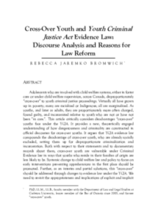ABSTRACT
Adolescents who are involved with child welfare systems, either in foster care or under child welfare supervision, across Canada, disproportionately “cross-over” to youth criminal justice proceedings. Virtually all have grown up in poverty; many are racialized or Indigenous; all are marginalized. As youths, and later as adults, they are proportionately more often charged, found guilty, and incarcerated relative to youth who are not or have not been "in care." This article critically considers disadvantages “cross-over” youths face under the YCJA. It provides a new, theoretically engaged understanding of how dangerousness and criminality are constructed in official discourses for cross-over youths. It argues that YCJA evidence law compounds the disadvantage of cross-over youth, who are already socially excluded, setting them up for disproportionate criminalization and incarceration. Both with respect to their statements and to documentary records about them, cross-over youth are vulnerable under Criminal Evidence law in ways that youths who reside in their families of origin are less likely to be. Systemic change to child welfare law and policy to focus on early interventions preventing apprehensions in the first place should be promoted. Further, as an interim and partial solutions, this “cross-over” should be addressed through changes to evidence law under the YCJA. We need to revisit the appropriateness and implications of explicit and implicit assumptions -running throughout youth criminal justice processes and protections – that a youth before the Court will be able to draw upon parental support.

